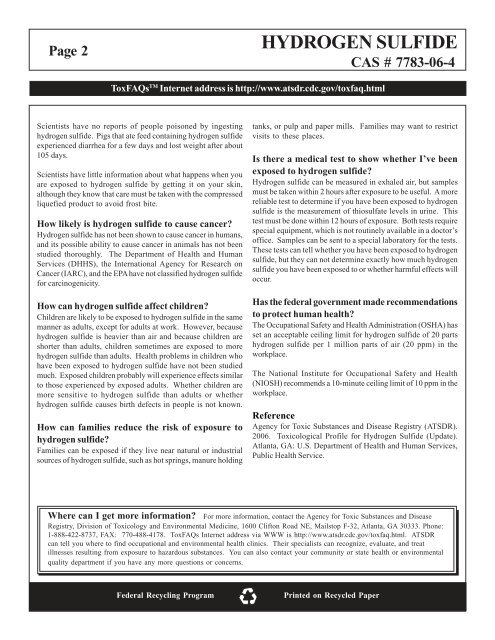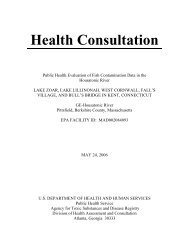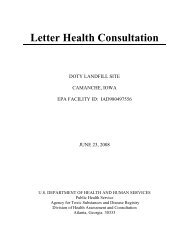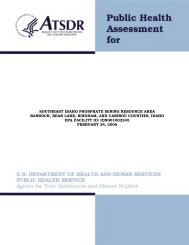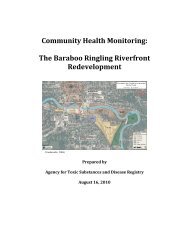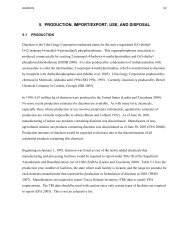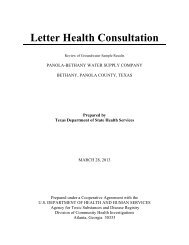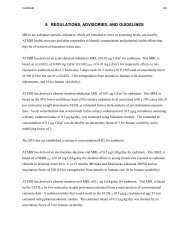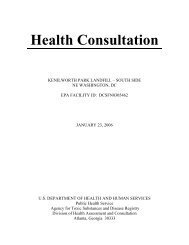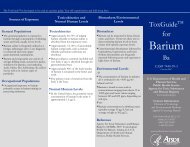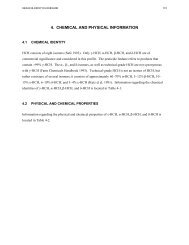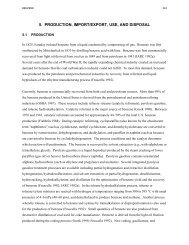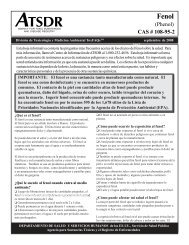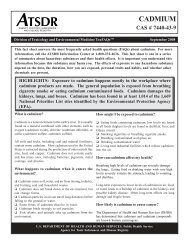Hydrogen Sulfide ToxFAQ - ATSDR
Hydrogen Sulfide ToxFAQ - ATSDR
Hydrogen Sulfide ToxFAQ - ATSDR
Create successful ePaper yourself
Turn your PDF publications into a flip-book with our unique Google optimized e-Paper software.
Page 2<br />
HYDROGEN SULFIDE<br />
CAS # 7783-06-4<br />
<strong>ToxFAQ</strong>s TM Internet address is http://www.atsdr.cdc.gov/toxfaq.html<br />
Scientists have no reports of people poisoned by ingesting<br />
hydrogen sulfide. Pigs that ate feed containing hydrogen sulfide<br />
experienced diarrhea for a few days and lost weight after about<br />
105 days.<br />
Scientists have little information about what happens when you<br />
are exposed to hydrogen sulfide by getting it on your skin,<br />
although they know that care must be taken with the compressed<br />
liquefied product to avoid frost bite.<br />
How likely is hydrogen sulfide to cause cancer?<br />
<strong>Hydrogen</strong> sulfide has not been shown to cause cancer in humans,<br />
and its possible ability to cause cancer in animals has not been<br />
studied thoroughly. The Department of Health and Human<br />
Services (DHHS), the International Agency for Research on<br />
Cancer (IARC), and the EPA have not classified hydrogen sulfide<br />
for carcinogenicity.<br />
How can hydrogen sulfide affect children?<br />
Children are likely to be exposed to hydrogen sulfide in the same<br />
manner as adults, except for adults at work. However, because<br />
hydrogen sulfide is heavier than air and because children are<br />
shorter than adults, children sometimes are exposed to more<br />
hydrogen sulfide than adults. Health problems in children who<br />
have been exposed to hydrogen sulfide have not been studied<br />
much. Exposed children probably will experience effects similar<br />
to those experienced by exposed adults. Whether children are<br />
more sensitive to hydrogen sulfide than adults or whether<br />
hydrogen sulfide causes birth defects in people is not known.<br />
How can families reduce the risk of exposure to<br />
hydrogen sulfide?<br />
Families can be exposed if they live near natural or industrial<br />
sources of hydrogen sulfide, such as hot springs, manure holding<br />
tanks, or pulp and paper mills. Families may want to restrict<br />
visits to these places.<br />
Is there a medical test to show whether I’ve been<br />
exposed to hydrogen sulfide?<br />
<strong>Hydrogen</strong> sulfide can be measured in exhaled air, but samples<br />
must be taken within 2 hours after exposure to be useful. A more<br />
reliable test to determine if you have been exposed to hydrogen<br />
sulfide is the measurement of thiosulfate levels in urine. This<br />
test must be done within 12 hours of exposure. Both tests require<br />
special equipment, which is not routinely available in a doctor’s<br />
office. Samples can be sent to a special laboratory for the tests.<br />
These tests can tell whether you have been exposed to hydrogen<br />
sulfide, but they can not determine exactly how much hydrogen<br />
sulfide you have been exposed to or whether harmful effects will<br />
occur.<br />
Has the federal government made recommendations<br />
to protect human health?<br />
The Occupational Safety and Health Administration (OSHA) has<br />
set an acceptable ceiling limit for hydrogen sulfide of 20 parts<br />
hydrogen sulfide per 1 million parts of air (20 ppm) in the<br />
workplace.<br />
The National Institute for Occupational Safety and Health<br />
(NIOSH) recommends a 10-minute ceiling limit of 10 ppm in the<br />
workplace.<br />
Reference<br />
Agency for Toxic Substances and Disease Registry (<strong>ATSDR</strong>).<br />
2006. Toxicological Profile for <strong>Hydrogen</strong> <strong>Sulfide</strong> (Update).<br />
Atlanta, GA: U.S. Department of Health and Human Services,<br />
Public Health Service.<br />
Where can I get more information? For more information, contact the Agency for Toxic Substances and Disease<br />
Registry, Division of Toxicology and Environmental Medicine, 1600 Clifton Road NE, Mailstop F-32, Atlanta, GA 30333. Phone:<br />
1-888-422-8737, FAX: 770-488-4178. <strong>ToxFAQ</strong>s Internet address via WWW is http://www.atsdr.cdc.gov/toxfaq.html. <strong>ATSDR</strong><br />
can tell you where to find occupational and environmental health clinics. Their specialists can recognize, evaluate, and treat<br />
illnesses resulting from exposure to hazardous substances. You can also contact your community or state health or environmental<br />
quality department if you have any more questions or concerns.<br />
Federal Recycling Program<br />
Printed on Recycled Paper


